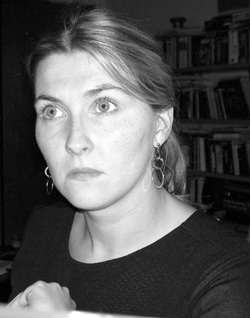INTERVIEW WITH LINA RAMONA VITKAUSKAS BY DENIS EMORINE

http://www.linaramona.com
First of all, who are you, Lina?
It was Jodorowsky who said,
"You cease to exist when you say, 'this is what I am.' "
However, who I am is not the same although actions define the soul.
I ask life questions in poetic forms, consider my Buddha nature and try to maintain mindfulness in everything I do.
(She likes to muse and be a muse).
You are both a publisher and a poet. Is it difficult to face up these two activities?
I think they work symbiotically. As a publisher, I read new poets and as a writer, I do the same. I am always
fascinated by other writers-new forms, methods, and ideas abound. It inspires me to read them.
You are a Lithuanian-American woman. How is it possible to mix two different cultures?
Do you think you have a specific inspiration for writing?
My parents were born in Germany (father) and Brazil (mother). Their parents, my grandparents, were all from
Lithuania and fled to these countries during the war. I was born in the United States in Virginia, and then
my parents moved to Chicago, where I primarily grew up between a Lithuanian neighborhood and a small town
outside the city. It has always been my challenge and greatest strength to continue questioning the atavistic
nature of my writing. I receive calls to my Lithuanian heritage in my every day mournings of life, decisions.
I find myself vicariously still relating these experiences. To some extent, I feel a significant duty to preserving
my nationality. I am always on the outskirts of American life, though I am quite immersed and versed in it. I feel
"Lithuanian". Being American is a strange thing for me to handle. When I visited the homeland in 1998, my features
told the story of a Lithuanian girl to strangers, though some doubt caressed their faces-they detected the American
in me as a mother bird detects a human scent on her young. This has been my experience internally for as long as I
can remember. I belong someplace where my history lies. I lie someplace where I make my history.
You manage "milk", an online literary magazine with Larry Sawyer. Could you explain its originality?
milk (www.milkmag.org) was created by Larry in 1998 and then, when we met in 1999, we decided to jointly approach the
venture. After one print issue entirely funded by ourselves, I captured an Internet stance. We have been online now for
8 years, one of the longest running Internet literary magazines. Our originality stems from intuitive selection. We do
not limit ourselves to any themes or styles. We enjoy the interesting collage of poetry, experiemental fiction, and visual
art that milk becomes when we assemble each annual issue.
Do you write in English only?
I attempt to write in Lithuanian and Spanish. I write and speak in amalgamated forms: Lithunglish, Spanglish.
What is the situation of poetry in the USA?
New York and San Francisco still have very alive scenes. What movements have grasped them, I am not
well-versed enough to say. In Chicago, however, there is an interesting group of experimental writers who
have recently put out an anthology adopted widely by many university curriculums: The City Visible: Chiacgo Poetry
in the New Century (Cracked Slab Books, 2007).
www.crackedslabbooks.com
Is "Milk" also a publishing house? Why (or why not?)
milk is a labour of love and Larry and I both work full-time at day-to-day jobs. Someday we will get grant
money to help us publish the issue in print and on CD-ROM annually.
What do you want to say in your writing?
I have always said that I am an Evaporating Language Photographer. I am disappearing between the lines of the
poetry I write, which I how I would express scientific emotion. I hope to make people think and feel and not
know which is more powerful.
Do you think there is a feminine specific voice in literature?
I feel both masculine and feminine energy from certain pieces of literature. It depends largely on what you read.
Any last comments?
Thank you for being interested and reading poetry. Viva la poesie!

|

